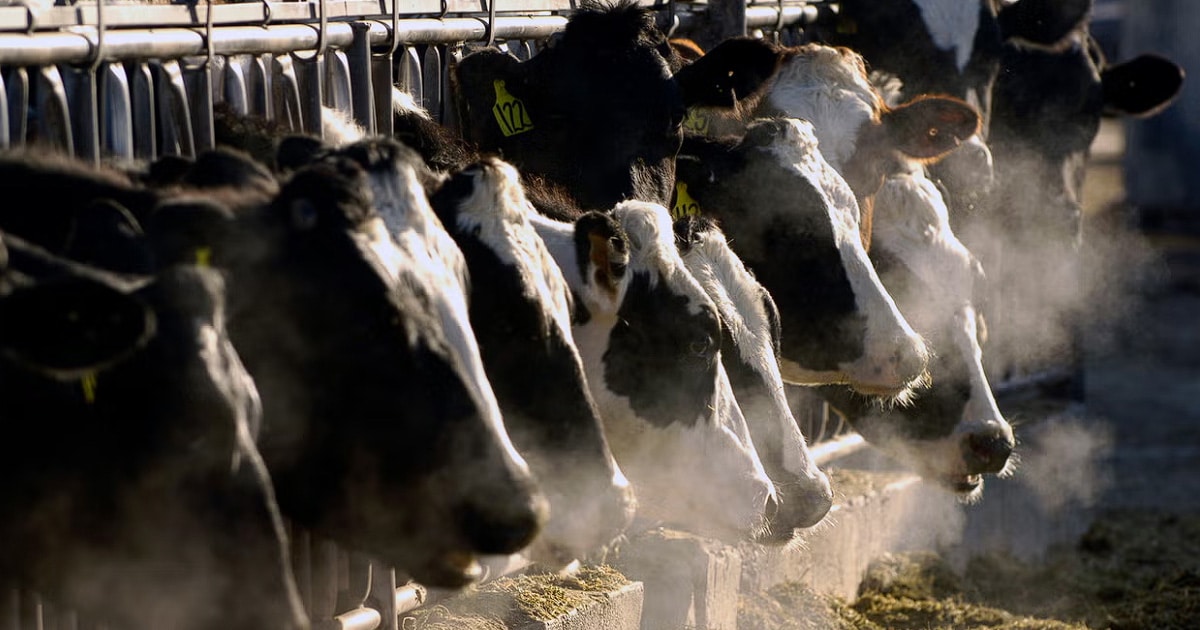
Bird flu is spreading to more farm animals. Are milk and eggs safe?
Health authorities emphasize that the potential threat to the general population is minimal, affirming that the stability and safety of the food supply in the United States are uncompromised.
The U.S. Food and Drug Administration stated that, presently, there is no indication that this situation presents a danger to public health or compromises the safety of the nationwide sale of milk.
Here’s what you need to know about bird flu and food:
WHICH STATES HAVE FOUND BIRD FLU IN DAIRY COWS?
Based on the latest findings, it has been confirmed that as of the end of last week, a particular strain of avian influenza, responsible for the deaths of a significant number of wild birds in recent times, has been identified in a minimum of 26 dairy herds across eight states in the United States. These states include Idaho, Kansas, Michigan, New Mexico, North Carolina, Ohio, Texas, and South Dakota.
The viral strain, designated Type A H5N1, has been identified in various mammalian species in recent years. Remarkably, its presence has now been reported in cattle, marking a significant development as confirmed by governmental health and animal authorities. Despite this new occurrence, detailed genetic examination of the virus has not revealed any indications of it acquiring enhanced transmissibility among humans, as affirmed by the U.S. Centers for Disease Control and Prevention.
HOW IS BIRD FLU AFFECTING FOOD PRODUCTION?
Authorities in 17 states have imposed limitations on the transportation of dairy cattle from regions with confirmed cases of the virus. Consequently, the impact on the overall production of commercial milk remains minimal as per official reports. It is suspected that the virus might have been transmitted to cows through contact with wild birds. However, there is also a possibility of the virus spreading among cows themselves, although this remains unconfirmed at present.
Agricultural producers are currently carrying out diagnostic tests on cows presenting symptoms of infection, such as a significant decline in milk production and lack of energy. Affected animals or those confirmed to be unwell are being isolated from the rest of the livestock on the farms. Encouragingly, the animals seem to show signs of recovery within a timeframe of approximately two weeks.
American egg producers are closely monitoring the recent outbreak of bird flu in chickens in Texas and Michigan. Despite millions of birds being culled, the FDA has reassured that the likelihood of contaminated eggs entering the consumer market or posing a risk of human infection is minimal due to rigorous federal oversight and precautionary measures in place.
DOES PASTEURIZATION KILL BIRD FLU?
According to researchers, there is no indication that individuals can acquire the virus through the consumption of food that has undergone pasteurization, heat treatment, or thorough cooking.
“It’s not a food safety concern,” said Lee-Ann Jaykus, an emeritus food microbiologist and virologist at North Carolina State University.
As of the current date, two individuals within the United States have been diagnosed with bird flu. One case involved a Texas dairy worker who had close contact with an infected cow, and subsequently experienced a mild eye infection which he has since recovered from. Additionally, in 2022, there was an incident where a prison inmate participating in a work program became infected while handling infected birds at a Colorado poultry farm. The only symptom exhibited in this case was fatigue, and the individual successfully recovered from the infection.
IS GROCERY STORE MILK SAFE FROM BIRD FLU?
Yes, according to food safety experts and government officials.
American producers are prohibited from marketing milk from unhealthy cows and are obligated to redirect and eliminate such product. Furthermore, milk that is distributed beyond state borders must undergo pasteurization, a method involving heat treatment that effectively eradicates harmful bacteria and viruses like influenza.
During a recent webinar, Tracey Forfa, the Director of the FDA’s Center for Veterinary Medicine, expressed a strong belief in the importance of pasteurization for ensuring the safety of the milk supply.
IS RAW MILK SAFE FROM BIRD FLU?
The FDA and the CDC exhibit a level of uncertainty regarding the safety of unpasteurized, commonly known as raw, milk that is being sold in numerous states. They have indicated that there is a deficiency of comprehensive data regarding the potential transmission of the H5N1 virus through these products.
To date, there have been no instances of herds associated with suppliers of raw milk reporting cases of bird flu-infected cows. However, regulatory agencies advised against the production or sale of raw milk and raw milk cheese items derived from cows demonstrating symptoms of, or having been in contact with, infected cows.
American health authorities have issued consistent cautions regarding the dangers associated with consuming raw milk, citing its link to foodborne illnesses. Over the span of two decades, the CDC documented over 200 outbreaks resulting in the sickness of over 2,600 individuals from 1998 to 2018.
Despite the federal warnings, Mark McAfee, the owner of Raw Farm USA in Fresno, California, and other advocates of raw milk have noted an increase in sales following the outbreak of H5N1 in commercial cows.
CAN YOU CATCH BIRD FLU FROM EGGS OR MEAT?
Only dairy cows, not beef cattle, have been infected or shown signs of illness to date, agriculture officials said.
On April 2nd, the leading egg producer in the United States paused its operations due to the detection of avian influenza in its chicken population. Cal-Maine Foods took the necessary measure of euthanizing approximately 1.6 million laying hens and 337,000 pullets following the identification of the disease.
The company said there was no risk to eggs in the market and that no eggs had been recalled.
Barbara Kowalcyk, the director of the Center for Food Safety and Nutrition Security at George Washington University, assures that eggs can be consumed safely when they are handled with care and cooked thoroughly.
“A lot of people like runny eggs. Personally, if I eat an egg, it’s very well cooked,” she said.
Still, Kowalcyk and others cautioned that the situation could change.
“This issue is rapidly evolving, and it is evident that this pathogen is undergoing changes that present numerous unknown variables,” she expressed. “It is evident that collective efforts are focused on swiftly unraveling the complexities surrounding this situation.”
The Health and Science Department at The Associated Press is assisted by the Science and Educational Media Group of the Howard Hughes Medical Institute. The AP retains full responsibility for the entirety of its content.


